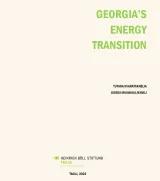Georgia's Energy Transition
Climate change shapes all contemporary discussions of energy policy. An increase in the frequency of natural disasters and extreme weather events is causing significant damage in many countries, leading to a shared commitment by the world's leaders to mitigate anthropogenic climate change.1 Energy transition is the most important instrument to mitigate climate change. The concept refers to the shift from fossil fuels (coal, oil, natural gas) to renewable energy sources (solar, wind, hydro, biomass, and others) that emit fewer greenhouse gases and contribute less to climate change. Transforming the energy sector is a key component of green growth, as it is responsible for more than half of greenhouse gas emissions.
Energy transition is the main pillar of the European Union's energy policy. According to the EU Green Deal, Europe aims to become the first climate-neutral continent by 2050.2 Transitioning to renewable energy sources is also a part of the EU’s plan to ensure its economic and energy security. The Russian invasion in Ukraine in 2022 and the subsequent energy crisis reaffirmed the need to reduce dependence on imported fossil fuels and diversify energy supplies. In May 2022, the EU Commission presented the RePowerEU plan, which proposes accelerating the transition to clean energy, saving energy, and diversifying the energy supply.
The revised Renewable Energy Directive, adopted in 2023, increases the EU's binding 2030 renewables target to at least 42.5%. (In 2021, the share of renewables in EU energy consumption was 21.8%).4 The EU’s energy efficiency target also increased from 9% to 11.7%.5 As for the diversification of supply, among other initiatives, the EU signed bilateral agreements with several countries to purchase pipeline natural gas (including Azerbaijan, Egypt, and Israel) and invested in a joint purchase of liquefied natural gas (LNG). The EU also initiated strategic partnerships with multiple states to help develop the supply of renewable hydrogen. As a result, a year after the Russia’s invasion of Ukraine, the EU decreased its demand for energy by 20% and replaced 80% of Russian pipeline gas. Additionally, up to 40% of electricity in 2022 came from renewables.
Like the EU, the green transition is in Georgia's energy security interest, as Georgia does not have any significant fossil fuel resources. The development of local renewable energy sources and improvements in energy efficiency will allow Georgia to become less energy-dependent and create a more resilient energy system.
The Georgian energy sector is currently in an active phase of reform. The main framework for the reform is defined by the EU Association Agreement and Georgia's Energy Community membership. The main objective of the reform is to ensure Georgia's energy security and, at the same time, as a potential member state, to align with EU legislation and the principles of green growth.
What does energy transition in the 21st century mean? Where does Georgia fit into the process? Is Georgia ready to transform its energy sector and why is it important for everyone to participate in the transition? By discussing these questions, we will highlight the main aspects of Georgia's energy transition and its challenges. The purpose of this document is not to analyze and evaluate energy policies and their effectiveness. The document is intended to reach a wide audience and engage them in the discussion of the energy transition.
Product details
Table of contents
Introduction 3
Energy Transition - Towards Green Development 5
Georgia's Energy Sector - 7
Energy Transition in Georgia: vision, first steps and challenges 10
Developing renewable sources 10
Energy efficiency 13
Conclusion and Recommendations 14
Bibliography 15
Authors 16
